#parliamentary debate
Text
the urge to just say nuh uh in a tournament round
48 notes
·
View notes
Text
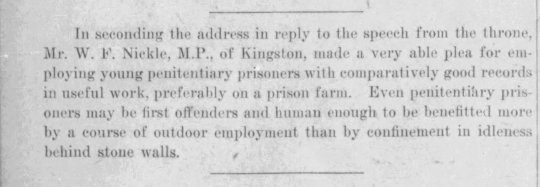
"In seconding the address in reply to the speech from the throne, Mr. W. F. Nickle, M.P., of Kingston, made a very able plea for employing young penitentiary prisoners with comparatively good records in useful work, preferably on a prison farm. Even penitentiary prisoners may be first offenders and human enough to be benefitted more by a course of outdoor employment than by confinement in idleness behind stone walls."
- from the Sault Star. December 4, 1912. Page 4.
#kingston ontario#member of parliament#parliamentary debate#parliament of canada#speech from the throne#borden government#canadian politics#w. f. nickle#penal reform#kingston penitentiary#first time offenders#prison farm
1 note
·
View note
Text
Considering the list of things we have to do, the time we estimate they will take to complete, and the current time on that clock, it is plainly evident that we have more than enough time to - and in fact, we deserve to - have a little snacky-snack.
And frankly, senator, I would find any suggestion to the otherwise to be simply undemocratic
2 notes
·
View notes
Text
The House of Commons reacting to Pitt’s Death
Pitt died on January 23, 1806 and the House of Commons meet the next day. The death of the Prime Minister had spread like wildfire – especially since his health had been so bad for so long, so there was no need for a public declaration. It was assumed everybody present was aware of the circumstances. In fact, the first order of business was a letter from the King read to the Members of Parliaments (the King thanked them for expressing their condolence upon the death of his brother, the Duke of Gloucester) and the continuous affair of the impeachment of Henry Dundas, Lord Melville. Pitt’s death was the third order of business that day. It was proposed that the House should debate his funeral and a show of public respect on Monday next, January 27.
His death was of a political and social consequence. Pitt’s passing left many important positions vacant, not just the office of Prime Minister. He had a considerable group of friends and followers in Parliament. Many of his colleagues, even if they were in opposition to his political points, expressed sympathy, respect for him.
There was also a certain order of business that was expected when a person of such public interest and a Prime Minister no less, died.
The topic of his death and funeral was again brought up on January 27, when a replacement for Pitt’s seat in Parliament was also sought. The House also took the time to reflect upon Pitt’s character and political legacy at length. Mr. Lascelles rose to present the motion:
I shall therefore conclude with moving, “That an humble address be presented to his majesty, that his majesty will be graciously pleased to give directions, that the remains of the right hon. William Pitt be interred at the public charge; and that a monument be erected, in the collegiate church of St. Peter, Westminster, to the memory of that excellent statesman, with an inscription expressive of the public sense of so great and irreparable a loss; and to assure his majesty that this house will make good the expences attending the same.”
Corbbett’s Parliamentary Debates, Vol. XI, London, p. 73.
The vote went as follows:
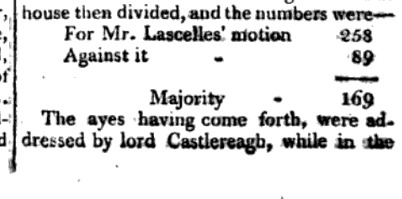
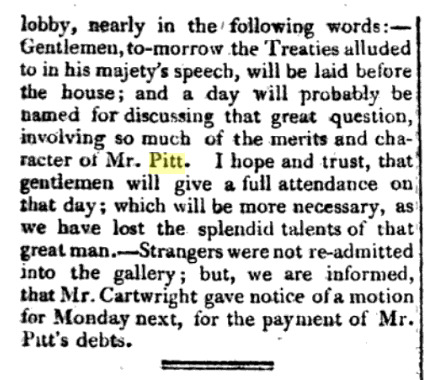
Corbbett’s Parliamentary Debates, Vol. XI, London, pp. 73-74.
Mentioned in the last instant is the debate over the full payment of Pitt’s debts (messy affair and messy debate) that would be discussed Monday next, February 3, 1806. On that day, the House was much more divided upon the topic of Pitt’s debts, but one very interesting speech came from nonother than Charles James Fox:
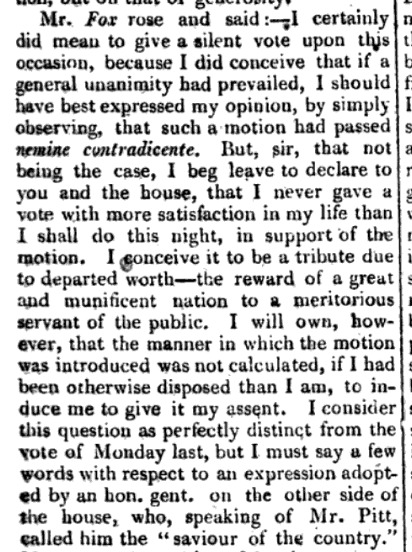
I shortened his speech a bit, but Fox essentially goes on to criticize some of the arguments and tactics made by the other proponents of the notion – while still being in support himself.
Corbbett’s Parliamentary Debates, Vol. XI, London, pp. 127-140.
#british history#history#william pitt the younger#william pitt#1806#charles james fox#politics#corbbett's parliamentary debates#henry lascelles#lord castlereagh
8 notes
·
View notes
Text
Liebe es vom deutschen Verkehrsminister zu erfahren, dass Streiks nicht nur Auswirkungen auf das bestreikte Unternehmen haben, sondern auch auf die Bürger*innen und auf die Wirtschaft. Brand-new information für mich als französische Person
#deutsch content#streiks#labor#not to be all French about this but#they're supposed to be inconvenient that's the point#how do you think we got legislation stopped before valls and macron showed up and decided parliamentary debate was unnecessary
2 notes
·
View notes
Note
"i dont know what tra means i just saw conservative and hit reblog 😭"
lol. lmao even.
literal echo chamber. y'all don't ever think for yourselves. you don't even know what you're standing against. it's pathetic, really. tell me, on a fundemental basis, without bias or what your circle of mutuals have told you, and without mention of anything like "trans genocide", what do radfems actually believe and advocate for in the first place? feel free to cheat and do some research on google, you might learn something true!
LMAO i did my college A-level qualifications in sociology, i have turned in papers on radical feminisms views on gender and crime for a grade for my future. just because my 50 year old lecturer never told me what TRA stands for on radblr and gctwt doesnt mean i dont understand what im against?? maybe you should try getting an actual education in what you believe in rather than soaking your brain in the internet discourse septic tank
#this is the most embarrassing ask ive ever gotten#plus i am an avid follower of my governments gra reform and trans rights parliamentary debates#i am scutely aware of what radical feminists sfand for#are YOU? or have you just got a mutual circle of transmisogynistic cislesbians who cut themselves because theyre not goldstar#lol#ask#anon
3 notes
·
View notes
Text
Thing that would be so funny would be organizing a british parliamentary style debate competition in ANY online fandom community, but firstly
a) Wow, what a nerdy thing to want
b) The unimaginable cost to humanity, organizing an ACTUAL round for "This House Believes Vriska Serket was justified"
c) As usual, no fucking judges.
5 notes
·
View notes
Text
How does he fucking manage it
#Who the hell does he think he is#Yeah let's just block the debating of a motion of no confidence in the Prime Minister#A motion of no confidence the Tories were fully expected to win by the way#As usual the man in number 10 thinks he's above the rules and conventions that everybody else respects#And his team have found a loophole as ever so that he doesn't have to bother#The fucking GALL of the man#Nothing to gain except the further erosion of the conventions and traditions of British democracy#Or at least whatever passes for it nowadays#Unless they were really THAT scared of their own MPs voting against them#Tory whips say the motion fell outside normal convention because the PM was singled out#When exactly has this government EVER cared about convention#They are the poster children for 'Oh but it's not TECHNICALLY against the rules so it's OK'#Utterly blase#Call me old-fashioned but as much as I would like Scottish independence I think that those in Westminster#who claim to want to STAY in Westminster#Should observe the traditions and parliamentary conventions of that place#ESPECIALLY if their name is the 'conservative' party and they like to go on and on about British democracy#I could understand if they thought the rules needed changing but no they're just massive hypocrites who think the rules don't apply to them#Frankly disappointed that Lindsay Hoyle isn't hammering on the door of Number 10 with a horsewhip right now#But I suppose that wouldn't be in accordance with parliamentary convention either WHICH EVERYBODY ELSE HAS TO RESPECT#Except Boris apparently who thinks he's some kind of president#Government has way too much control over the house and its timetable but I understand that's the rules#However even if it IS their prerogative to deny time for the debate#Doesn't change the fact that if the Tories were (as thought) so likely to win the motion of no confidence#why have they been too cowardly to allow it to be debated#Chickens didn't want to be exposed as siding with Boris to their constituents but also wanted to stay in power
7 notes
·
View notes
Text
Transforming narratives: unravelling India’s transition in slum definitions
The Hindu (Indian Newspaper) published an article summarising my paper that was published in October 2023 edition of EPW. The paper had discussed how the notion of slums developed and was treated in the parliament from 1953 to 2014. Although I am posting the clip here for my archive, I have not been contacted or given any inputs for this article. So, I have not contributed in any way for this…

View On WordPress
0 notes
Text
Jeudi
There is a very important debate in parliament in the UK tomorrow.
Here is Andrew Bridgen MP talking about it :
youtube
View On WordPress
0 notes
Text
guess what guys I have to give a congress speech tomorrow
4 notes
·
View notes
Text
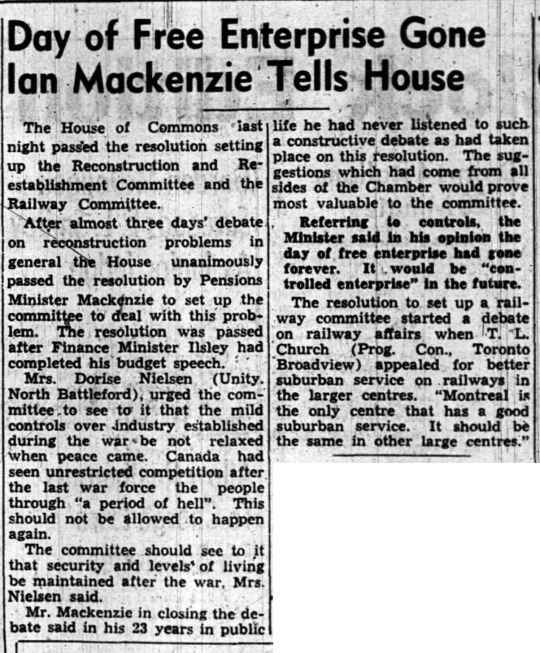
"Day of Free Enterprise Gone lan Mackenzie Tells House," Ottawa Journal. March 3, 1943. Page 3.
-----
The House of Commons last night passed the resolution setting up the Reconstruction and Reestablishment Committee and the Railway Committee.
After almost three days' debate on reconstruction problems in general the House unanimously passed the resolution by Pensions Minister Mackenzie to set up the committee to deal with this problem. The resolution was passed after Finance Minister Ilsley had completed his budget speech.
Mrs. Dorise Nielsen (Unity, North Battleford) urged the committee to see to it that the mild controls over industry established during the war be not relaxed when peace came. Canada had seen unrestricted competition after the last war force the people through "a period of hell". This should not be allowed to happen again.
The committee should see to it that security and levels of living be maintained after the war, Mrs. Nielsen said.
Mr. Mackenzie in closing the debate said in his 23 years in public life he had never listened to such a constructive debate as had taken place on this resolution. The suggestions which had come from all sides of the Chamber would prove most valuable to the committee.
Referring to controls, the Minister said in his opinion the day of free enterprise had gone forever. It would be "controlled enterprise" in the future.
The resolution to set up a railway committee started a debate on railway affairs when T. L. Church (Prog. Con., Toronto Broadview) appealed for better suburban service on railways in the larger centres. "Montreal is the only centre that has a good suburban service. It should be the same in other large centres."
#house of commons#parliament of canada#parliamentary debate#postwar reconstruction#postwar planning#postwar canada#pensions minister#regulation of capitalism#capitalism in canada#mackenzie king government#warfare state#welfare state#birth of the welfare state#canada during world war 2
1 note
·
View note
Text
Article 121 of the Indian Constitution: Restrictions on Discussion in Parliament
The Indian Constitution is a comprehensive document that lays down the fundamental principles and framework for governance in the country. Among its many provisions, Article 121 addresses the restrictions on the discussion of certain matters in the Parliament. This article focuses on a specific aspect of Article 121, which pertains to the discussion regarding the conduct of judges in the…
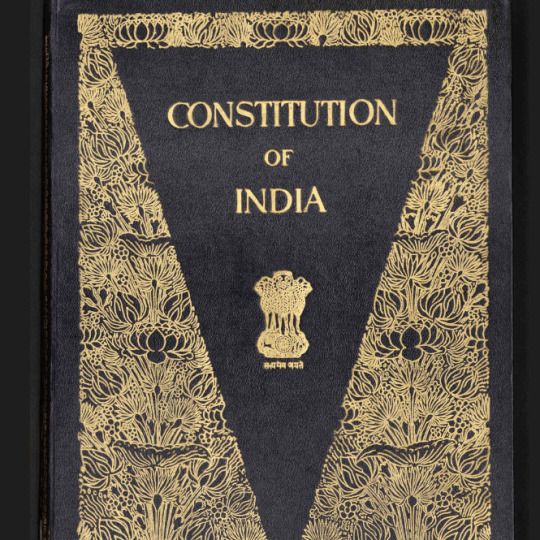
View On WordPress
#accountability#Article 121#constitutional balance#constitutional provisions#Criticisms#Debates#discussion restrictions#High Court#impartiality#Indian Constitution#judicial conduct#judicial independence#judiciary#justice system#legal policy#Parliament#parliamentary scrutiny#political interference#public trust#removal of judges#rule of law#safeguarding#supreme court#transparency
0 notes
Text
if you live in the UK please sign this petition for a ceasefire and to end the occupation. it's currently at 69,815 signatures and we just need 100,000 for a parliamentary debate. also, remember to verify your email for it to count
3K notes
·
View notes
Text
Young Royals is anti-monarchist propaganda (always has been)
I think it’s fair to say that most of the fandom was quite happy with the finale. However, I’ve seen a handful of posts by people who were unhappy, specifically those who were unhappy with Wille giving up his place in the line of succession. These criticisms range in everything from dismissing Wille’s choice (Wilhelm has made a harsh decision without thinking of the consequences, this won’t actually make the media circus around him go away), to those disappointed in how the monarchy in general was represented (Wille could have modernized the institution, no one in the show attempted to consider how the monarchy could be good, actually). I don’t want to invalidate anyone’s feelings about the finale. If you didn't like it, that’s more than ok and I don’t want to argue with anyone about their taste.
But when it comes to criticism about Wilhelm giving up the throne, I do find myself frustrated at what I see as a fundamental misunderstanding of what this show was trying to communicate. Young Royals, plain and simple, is a story that denounces the incompatibility of antiquated and hierarchical institutions (Hillerska, the monarchy) with equality and justice.
If you’ve had the displeasure of being my fandom friend you’ll know that I’ve spent the last 3 years yelling about how this show is about abolishing the monarchy. I even wrote a lengthy fanfic with the sole excuse of having Wilhelm arrive at this conclusion. Still, I knew that whatever statement the show wanted to arrive at, we’d only really be getting to it at the end of the show.
Seasons one and two were setting up all the characters on the chessboard for the end: Wilhelm is the Crown Prince, although he does not want to be. He and Simon are in love, but Wilhelm’s role drives a wedge between them. Erik’s legacy and August's spot next in line are keeping Wilhelm in his place.
From episode one, I think the show was telling us about the many things that are wrong with the monarchy, but I don’t think it’s until season three that these discussions become more explicit. Is this why some people were disappointed by the ending? Maybe so. Still, I wanted to look at how season three in particular answers some of the questions or issues people are bringing up regarding both the monarchy and the Wilhelm’s choice.
What do you like about the monarchy?
Season 3 Episode 4 is the first time we hear an explicit discussion about why the monarchy could potentially be a good institution. I’ve seen some people complain that the show didn’t give this idea enough thought.
I completely disagree with this take: the short conversation Wille and Simon have in this episode is succinct, but still effective at presenting both arguments in this debate. A longer and more drawn out conversation would have been a bit unrealistic and probably boring to watch. These are not academics having a debate, but two teenagers who are talking about what for them is emotionally charged.
There’s also no need for a longer, more detailed discussion. Wilhelm does provide a very good answer to the question: The monarchy is there to unite the people. To be a neutral party in situations when the government cannot or will not interfere.
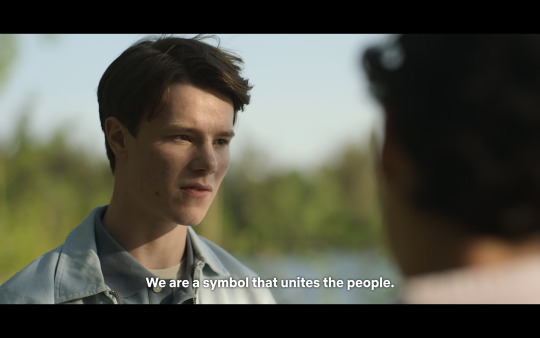

A quick civics lesson: In parliamentary democracies, the monarch serves as the Head of State.
This role is predominantly representative, although in many places the government is formed in the name of the monarch. This could, theoretically, grant them some political power-- since they could technically reject the winning party from forming a government. However, in most parliamentary monarchies, the King or Queen simply has to accept whatever decision is made based on election results.
However, the value of the Head of State is precisely in its apolitical nature. Regardless of who’s in power, the head of state is a neutral ambassador of the nation, both in and outside of their country. Their job is diplomatic and representative, and one that is thoroughly divorced from politics. This is what Wilhelm meant when he said that the monarchy was there to ‘unite the people’. Whenever I’ve spoken to pro-monarchy folks about their beliefs, they cite this as the reason why they like it.
It’s easy to see why Wilhlem would latch on this as his main argument to defend the institution. I don’t think there is anything inherently bad about having a separate head of state that represents the country. I don’t think the major grip with this issue is the having a head of state, but the fact that the head of state is a hereditary position. Simon says this himself twice in this episode: the issue is not that the head of state exists, but that the head of state is not an elected position. Furthemore, the head of state is a role that is imposed on a person not by their talent as a public speaker or negotiator, but by a simple accident of birth.
The job’s legitimacy or importance should not be above any individual’s right to autonomy and self-determination. Furthermore, considering that taxpayers are the ones who finance this position, shouldn’t they be able to elect who it is?
Let’s imagine a scenario where a friend tells you they’ve gone into a career because everyone in their family works in that industry, and they simply had no choice in the matter. It wouldn’t even matter if they were good or bad, they had a job in this career guaranteed from birth.
Would you not be concerned that maybe your friend is unhappy for a rather unnecessary reason? Would you not think that perhaps someone who actually wanted the job would be better suited for it? Would you think it right for a company to hire someone simply because of their family history? Would you consider any of this fair? And what is so special about monarchy that makes us have a different answer for it than we would if the question was about law or medicine?
You’ll always be famous.
Another common criticism I’ve seen is that Wilhelm will inevitably regret his decision, especially once he realizes that public scrutiny will not be going away. This is true, Wilhelm will likely always be a figure of public interest. But to me, this has always been a negative consequence of the monarchy, and I have a hard time seeing this is a valid reason why he should stay in it.
From the second we meet him, we know Wilhelm is uncomfortable with both the public attention and the scrutiny placed on him. However, this goes a bit further than that. I’d argue than more than the scrutiny itself, Wilhelm is weighed down by having to keep a public image. Because, remember folks, Wilhelm is not merely an awkward teenage boy with acne and a crush. No, no, Wilhelm is the State. Wilhelm is going to be a publicly-funded representative of the nation . This means, of course, that there’s a narrative, as he mentions himsef, that needs to be put forward. One that’s generic, serious, and unproblematic:



From the get go, Wilhelm is uncomfortable with the inauthentic and performative aspect of his role.This is a constant we see with Wilhelm in seasons one and two: every ‘performance’ he has to do fills him with nausea, anxiety, or some sort of discomfort.
In season three, Wilhelm begins acquiescing to this performance. Uncomfortable as he may be, for most of season 3 he’s accepted that this is his role. However, the attention this season shifts from Wilhelm to Simon, who’s now the one facing public scrutiny. The difference is that, unlike Wille, there’s no role for Simon to play. Nothing about who he is or what he believes is compatible with the public image the monarchy is putting forward. The only thing he can do in this situation is disappear, and Wilhelm is tasked with having to ask that of him.
I know a lot of people were exasperated at Simon’s very bad and clumsy social media presence. I’m not gonna argue that my boy wasn’t being a bit cringey, because he absolutely was. But I think the larger commentary here has more to do with the expectation that these two teenagers have to censor and edit themselves to comply with a particular PR image.
Ultimately, the criticism that Wilhelm will always be famous leads us straight back to the institution. Why does an underage boy have the same PR expectations as a politician? Why is a teenager dating his classmate + being cringe online justification for doxxing him? Unfortunately, no abdication is really going to undo any of this, and things are certainly going to be crazy once Wilhelm announces he’s stepping down .
However, this time around both he and Simon will at least have the agency to decide what they want to do with their public image, including the decision to disappear from the public completely if that’s what they want.
Queer representation
This a sentiment that has been in the fandom for some time now. This was the main argument why some people wanted Wille to stay in the monarchy. Sure, the institution has always been about bloodlines and tradition. But wouldn’t it be so nice to have Wilhelm as a symbol for the queer community? I’ve always found this idea a bit shallow. I’m not sure how much of a symbol of a queer and progressive country Wilhelm could be, when the whole idea is predicated on absolutely no one having a choice in the matter. Is it really impressive to accept the queerness of the guy you already had no choice in accepting?
There’s three scenes in season 3 where the potential Wilhelm -and by extension Simon- could have for the queer community come up. Farima brings it up in the first episode, but the framing here is reversed. Wilhelm isn’t serving the LGBTQ community by being a queer Prince, but the monarchy is using Wilhelm (and his queerness) to appear progressive.

The show, however, does humor this idea with the May 1st photo. We see what Simon and Wilhelm could potentially do for the community by simply existing as who they are: they’re inspirational. It gives Simon, briefly, hope that maybe something good could come out of this.

But this moment is quite literally framed by politics. It doesn't matter that Simon is not participating in that manifestation, anything that is slightly connected with politics is a challenge to neutrality of the monarchy. This same idea is stated more explicitly int the next episode, when Wilhelm is reviewing the options for his charity.
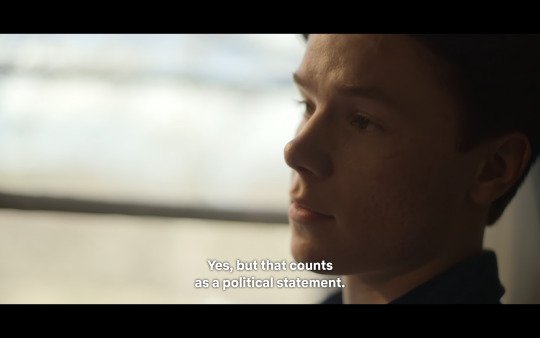
Ultimately, any action significant enough to be truly impactful, would be bordering the limits of what could be considered political. He's got to stick it out with these quite frankly boring and limited themes, all for the sake of staying on the very narrow lane of things that are not political.
The weight of the crown.
Stories about Kings and Queens usually carry the same fundamental tension of duty vs self.
In order to rule, our protagonist has to sacrifice themselves, usually for the sake of their country and people. The Crown is an excellent example of this type of story. Sacrifice in that series is framed as something noble and selfless.
Young Royals started out with this same fundamental tension, but the main difference is that Young Royals has framed this debate as a question:
Why should Wilhelm give himself up, his happiness, the love of his life, and his mental well-being? What’s so important and valuable about this institution that requires this sacrifice?
Wilhelm’s journey is about accepting and voicing his answer. He doesn’t want to be Crown Prince, he doesn’t want to be King.
But by virtue of taking part of this journey with him, we’re able to examine this question from a different perspective: Is this institution valuable enough to justify all of this? I think the show is inviting all of us to evaluate this situation and arrive at the conclusion that it isn’t.

Even someone like August, who wanted this, is weighed down by the realization of just how much the crown weighs. Of course, a big part of the fandom probably doesn’t live in countries with parliamentary monarchies. Still, considering the worldwide popularity of the British Royals, for example, I still think it’s a worthwhile exercise to question the validity of these institutions. Are they really worth sustaining? And if they’re not, why should we continue to drag them on into the present, citing tradition?
#young royals#prince wilhelm#Wilhelm#wilhelm yr#simon eriksson#Wilmon#Politics in Young Royals#august horn#yr meta#my and
320 notes
·
View notes
Text
My debate club was having a parliamentary-style debate on whether or not Sonic was submissive and breedable.
356 notes
·
View notes